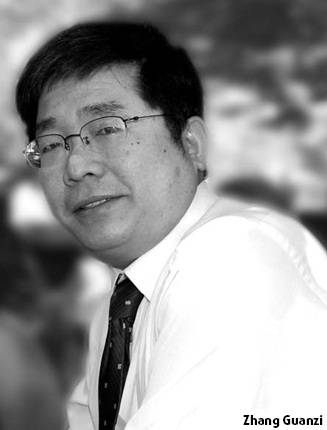Op-Ed Contributors
China through a looking glass, brightly
By Yang Ning (China Daily)
Updated: 2010-02-04 07:49
 |
Large Medium Small |

Zhang Guanzi uses the views of Harvard scholars and experts as a mirror to see China's image. The researcher with the Chinese Academy of Social Sciences has reflected that image in his book, China in the Eyes of Harvard.
But why are the views of Harvard University scholars so important? Zhang says: "The results of research carried out at Harvard are the most likely to influence America's policy toward China The university's professors, who also serve as think tanks for the US government, have many different but remarkable insights into China."
Harvard is not only the world's top institution of higher learning, but also a strong base of Chinese studies. Not for nothing does the university hold at least one lecture or seminar on China every day and almost all its schools have China-related research or training programs. As a visiting scholar of Harvard Kennedy School, Zhang has felt this "China fever" firsthand.
Last year was the best time for his project, because it was the 60th year of the founding of the People's Republic of China and 30th year of reform and opening up. The 60th birthday is very important in Chinese culture. As Confucius says: "At 60, my ear was an obedient organ for the reception of truth."
"So it is high time China listened to what others have to say about it," Zhang says. "For me, China in the Eyes of Harvard is a gift for our country on its 60th birthday." To prepare the "gift", he invited some 30 young and middle-aged Chinese scholars from Harvard to take part in one-to-one interviews. They talked with 47 experts on China, and their topics ranged from history, culture and literature to politics, economics and science.
| ||||
Though the insights of a majority of the experts conform to China's reality, many of them don't. Zhang says experts have two types of unrealistic views about China: "subjectively unfriendly" and "objectively unfriendly. The first group insists on imposing Western values upon China and use Western standards of human rights and democracy to judge China. Most of the experts in the second group have never visited China and seldom communicate with Chinese people, and hence see an incomplete picture of China.
What is the complete picture? China is the most populous country in the world. Chinese people established the People's Republic of China after years of struggle, hardship and wars. They ultimately found a development path suitable to China's conditions - the path of socialism with Chinese characteristics. And the reform and opening is a long stretch of that path, aimed at raising the living standards of the people and protecting human rights.

But China is still a developing country with many underdeveloped regions. And though it is extremely important that China achieves development, reform and stability at the same time, it is no easy task. "Before judging China, one has to analyze its historical background as well as its present condition," Zhang says.
Since seeing is believing, Zhang suggests that all overseas scholars on China, including but not limited to those from Harvard, come to the country to get a firsthand experience of the subject of their research. Their visits will make them better understand what and why Chinese people are thinking and doing, and help them reach objective conclusions.
Still, how does Harvard qualify to be the mirror that best reflects China? Harvard is full of world-class economists, political scientists, jurists, historians, writers and philosophers. "Harvard experts not only have the highest academic level in the world, their different but remarkable insights into China are also of great reference value to China and the US both," Zhang says. "I believe Harvard is the best, the most suitable and the most qualified mirror for China."
The university has a long association with China. It has paid close attention to research on Chinese issues that are the most comprehensive in the world. Harvard got its first Chinese teacher way back in 1879. Today, it has three highly acclaimed and efficient research centers for Chinese studies and contemporary issues: Harvard Yenching Institute, Fairbank Center for Chinese Studies and Harvard University Asia Center.
Zhang left his footprint in every corner of these research centers during the one year he spent there as a visiting scholar. He talked with professors and officials, browsed through books and documents in the libraries and got to know about ongoing research and projects. "Although they are far removed from China geographically, I'm impressed by their professional approach to Chinese studies," Zhang says.
Summarizing his views about the centers, he says the Harvard Yenching Institute, set up in 1928, has a magnificent library with a collection of 1 million books, a whopping 659,000 of which are in Chinese. The Fairbank Center was founded in 1955. And since then it has played an active role in promoting studies on modern and contemporary China. And the Harvard University Asia Center, set up in 1997, focuses on China's political and economic transformation.
The research centers celebrated the 60th anniversary of the PRC in advance. The most memorable celebration was a three-day conference - The People's Republic of China at 60: An International Assessment - hosted by the Fairbank Center last May. "Distinguished scholars from around the globe enriched the conference with their views on China's past, present and future," he says. "That was an extraordinarily energetic exchange of views."
"I'm delighted to see Harvard's focus on China. But the 'China fever' also means the country will face more challenges because of the problems the experts highlight."
He wrote the book keeping exactly this in mind, he says. If the problems are true, China can take measures to solve them in order to move more smoothly toward a better future and if they are not, it can stand up and clarify the misunderstandings. That's what this book is all about."
(China Daily 02/04/2010 page9)











